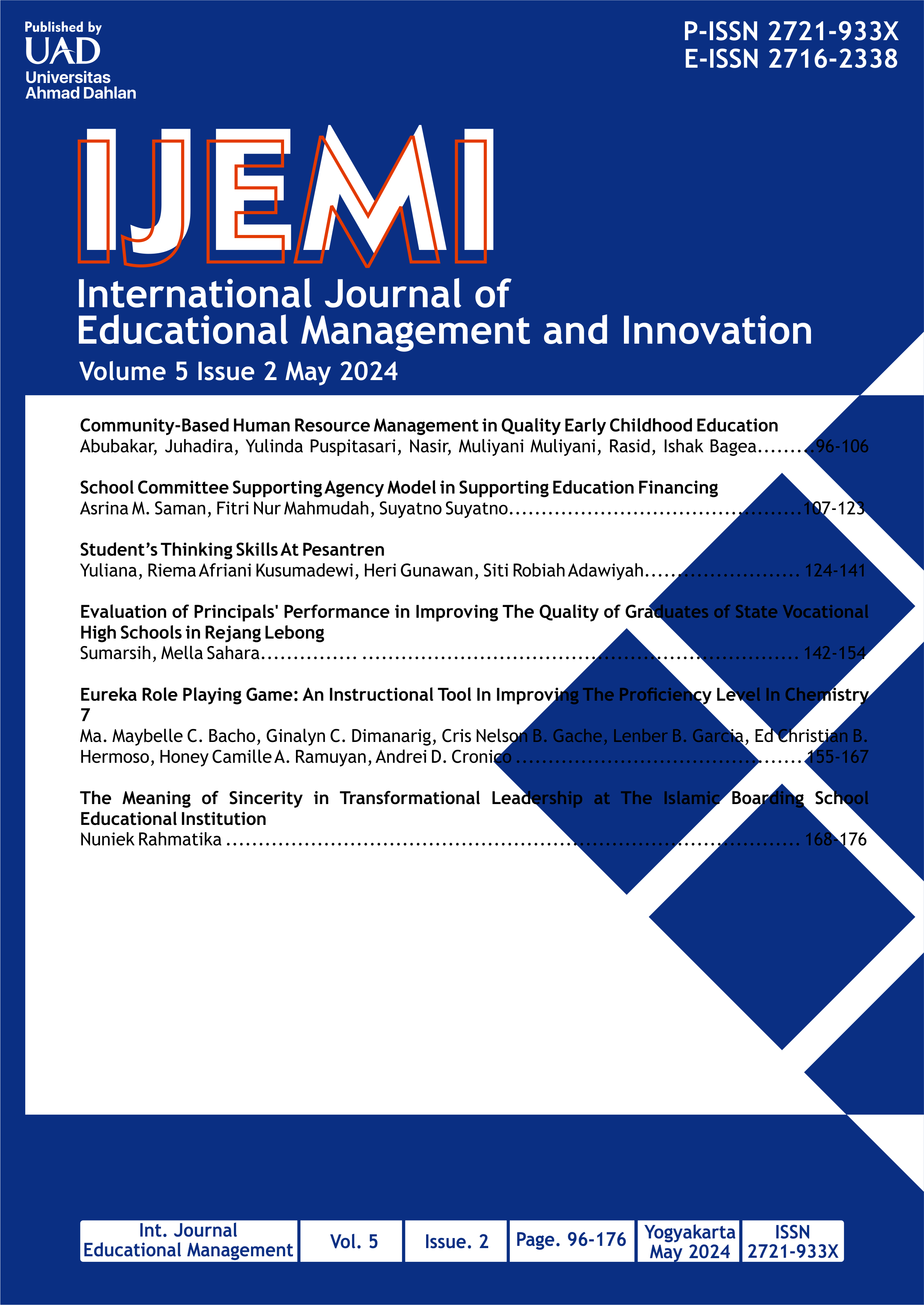The Meaning of Sincerity in Transformational Leadership at The Islamic Boarding School Educational Institution
DOI:
https://doi.org/10.12928/ijemi.v5i2.9656Keywords:
Meaning of sincerty, Leardership, TransformasionalAbstract
Sincerity is defined as hope only in Allah SWT. A leader can find the meaning of his members' sincerity so that they have better work enthusiasm. The purpose of this research is to determine transformational leadership behavior that interprets the sincerity of its members and the form of meaning of sincerity in transformational leadership that can realize innovation in Islamic boarding school educational institutions. This research approach uses phenomenology. Data collection used triangulation methods, namely observation and interviews. Data validity techniques are carried out using triangulation methods, member checking, and auditing. The results of this research found that the meaning of Ikhlas in transformational leadership is that sincerity is analogous to the spirit while charity is the body so that Ikhlas can create a conducive climate and can develop creativity and innovation in Islamic boarding school educational institutions.
References
A. Hamzah. (2020). Metode Penelitian Fenomenologi Kajiann Filsafat Dan Ilmu Pengetahuan Dilengkapi Dengan Contoh Desain Tahapan Proses Dan Hasil Penelitian. CV. Literasi Nusantara Abadi, 51-67.
Anugrah Ruri Liana, Asrin Ahmad, Musa Faisal, & Tanjung Alwin. (2019). Islam, Iman Dan Ihsan Dalam Kitab Matan Arba‘In An Nawawi (Studi Materi Pembelajaran Pendidikan Islam Dalam Perspektif Hadis Nabi Saw). Tarbiyah: Jurnal Ilmiah Pendidikan Agama Islam, 09(02). https://doi.org/https://doi.org/10.18592/jtipai.v9i2.3422
Bahijah, I., Rahmatika, N., Ahmad, A., Nur, S., & Ishak, S. (n.d.). KURIKULUM PESANTREN BERBASIS SAINS DI PONDOK PESANTREN SAINS SALMAN ASSALAM: SEBAGAI MODEL MODERASI AGAMA DALAM PENDIDIKAN.
Dhaisani Shafira, & Rahmania Farra Anisa. (2022). Peran Ikhlas sebagai Salah Satu Faktor Pendukung Kesehatan Mental. Jurnal Psikologi Islam, 09(01).
Eriksson, J. (2010). Self-expression, Expressiveness, and Sincerity. Acta Analytica, 25(1), 71–79. https://doi.org/10.1007/s12136-009-0076-y
Hafis, M., & Khudrotun, N. (2023). KEPEMIMPINAN MORAL DALAM PERPEKTIF IS THE MODEL FOR INTERPERSONAL TEACHER BEHAVIOR. Jurnal Ilmu Sosial Dan Ilmu Administrasi Negara, 07(01).
Hidayat, R. A., & Nurhidayati. (2023). PENGARUH ISLAMIC LEADERSHIP, KNOWLEDGE DONATING DAN KNOWLEDGE COLLECTING TERHADAP PENINGKATAN WORK SPIRIT. JURNAL ILMIAH SULTAN AGUNG, 2(1).
Khiyarusoleh, U. (2020). Konseling Indigenous Pesantren (Gaya Kepimpinan Kyai dalam Mendidik Santri). Jurnal Kependidikan: Jurnal Hasil Penelitian Dan Kajian Kepustakaan Di Bidang Pendidikan, Pengajaran Dan Pembelajaran, 6(3), 441. https://doi.org/10.33394/jk.v6i3.2779
Nata, A. (2012). Manajemen Pendidikan Mengatasi Kelemahan Pendidikan Islam di Indonesia .
Nilna, H. B. (2022). KEPEMIMPINAN PROFETIK KYAI IMAM BADRONI BURHAN DI YAYASAN PONDOK PESANTREN MIFTAHUS SHIBYAN PLOSOKLATEN KEDIRI. Institut Agama Islam Negeri Kediri.
Pragholapati, A. (2020). PENGALAMAN SESEORANG YANG BERCERAI KARENA PERSELINGKUHAN DI KOTA BANDUNG: FENOMENOLOGI. Jurnal Surya Muda, 2(2), 66–75. https://doi.org/10.38102/jsm.v2i2.64
Pramitha, D. (2020). Kepemimpinan kyai di pondok pesantren modern: Pengembangan organisasi, team building, dan perilaku inovatif. Jurnal Akuntabilitas Manajemen Pendidikan, 8(2), 147–154. https://doi.org/10.21831/jamp.v8i2.33058
Pramudyo, A. (2013). IMPLEMENTASI MANAJEMEN KEPEMIMPINAN DALAM PENCAPAIAN TUJUAN ORGANISASI. JBMA, 1(No 2).
Rohmatun, A. A. A., Maimun, M. Y., & Nabila, P. A. D. (2021). PROBLEM SOLVER KRISIS KEPIMPINAN PENDIDIKAN ISLAM DI PONDOK PESANTREN AL MUNAWWARIYAH. Jurnal Pendidikan Dan Dakwah, 3(No 2).
Suhardi, Muhammad Imanuddin, Kunarso, Rofiq Hidayat, Sulaiman, Yohanes Umbu Lede, Arif Ahmad Fauzi, Fahrurrazi, Yosefo Gule, Siraj, Basri, Syafruddin, Roikhan Mochamad Aziz, & Yanti Krismayant. (2022). Manajemen Kepemimpinan Pendidikan Kontemporer (Susanto, Ed.). Publica Indonesia Utama.
Susilo, A., & Wulansari, R. (2020). Sejarah Pesantren Sebagai Lembaga Pendidikan Islam di Indonesia. Tamaddun: Jurnal Kebudayaan Dan Sastra Islam, 20(2), 83–96. https://doi.org/10.19109/tamaddun.v20i2.6676
Suwarno. (2020). Influence of Leader Orientation, Working Spirit and Working Environment against Employee Performance in Hospital Pertamina Pangkalan Brandan. International Journal of Research and Review, 7(7).
Tua, N., Gaol, L., Kristen, M. P., Kristen, P., & Tarutung, I. (n.d.). TEORI KEPEMIMPINAN: KAJIAN DARI GENETIKA SAMPAI SKILL.
Zaini, H. (2017). PERAN KEPEMIMPINAN KIAI DALAM PENINGKATAN KUALITAS PONDOK PESANTREN DI KABUPATEN CIAMIS. Jurnal Administrasi Pendidikan, 14(2), 114–120. https://doi.org/10.17509/jap.v24i2.8299
Downloads
Published
How to Cite
Issue
Section
License
Copyright (c) 2024 Nuniek Rahmatika

This work is licensed under a Creative Commons Attribution-ShareAlike 4.0 International License.
The copyright to this article is transferred to Universitas Ahmad Dahlan (UAD) if and when the article is accepted for publication. The undersigned hereby transfers any rights in and to the paper including without limitation all copyrights to UAD. The undersigned hereby represents and warrants that the paper is original and that he/she is the author of the paper, except for material that is identified as to its source, with permission notices from the copyright owners where required. The undersigned represents that he/she has the power and authority to make and execute this assignment.
We declare that:
This paper has not been published in the same form elsewhere.
It will not be submitted anywhere else for publication before acceptance/rejection by this Journal.
Copyright permission is obtained for materials published elsewhere and which require this permission for reproduction.
Furthermore, I/We hereby transfer the unlimited rights of publication of the above-mentioned paper in whole to UAD. The copyright transfer covers the exclusive right to reproduce and distribute the article, including reprints, translations, photographic reproductions, microform, electronic form (offline, online), or any other reproductions of similar nature.
The corresponding author signs for and accepts responsibility for releasing this material on behalf of any and all co-authors. This agreement is to be signed by at least one of the authors who have obtained the assent of the co-author(s) where applicable. After submission of this agreement signed by the corresponding author, changes of authorship or in the order of the authors listed will not be accepted.
Retained Rights/Terms and Conditions
Authors retain all proprietary rights in any process, procedure, or article of manufacture described in the Work.
Authors may reproduce or authorize others to reproduce the Work or derivative works for the authors' personal use or for company use, provided that the source and the UAD copyright notice are indicated, the copies are not used in any way that implies UAD endorsement of a product or service of any employer, and the copies themselves are not offered for sale.
Although authors are permitted to re-use all or portions of the Work in other works, this does not include granting third-party requests for reprinting, republishing, or other types of re-use.




